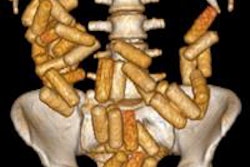Dear AuntMinnieEurope Member,
The start of the Rio Olympics is less than four months away and the flame's set to be lit again later this month, so no doubt the medical team on duty in Brazil will want to learn from the inaugural European Games, held last year in Baku, the capital of Azerbaijan.
Information about how the imaging service was handled at the Baku games is available now. To get set for Rio, go to our PACS Community, or click here. And make sure you check out an upcoming event in May on Olympic imaging, details of which are at the end of the article.
Detecting drug mules by physical examination or laboratory analysis is notoriously difficult, but imaging can step in and play a vital role. Radiologists from Turkey have an extensive knowledge of this field, and they've shared their experiences in a new article. Visit our CT Community, or click here.
The controversial topic of gadolinium in the brain will come under further scrutiny at next month's German radiological congress, to be held in Leipzig for the first time. Around 7,000 attendees are expected, and seven international sessions promise to bolster the program. For a preview of this important annual meeting, click here.
Adding digital breast tomosynthesis to screening with full-field digital mammography can have a significant impact on invasive cancer detection rates, and can also reduce recall and false-positive rates, U.K. researchers have confirmed. Get the details in the Women's Imaging Community, or click here.
Scottish researchers, meanwhile, have compared the use of coronary CT angiography (CCTA) to standard care alone in more than 4,000 chest pain patients. Their trial revealed sharply reduced event rates and fewer negative angiographies when CCTA was used to guide patient management. To learn more, click here.



















